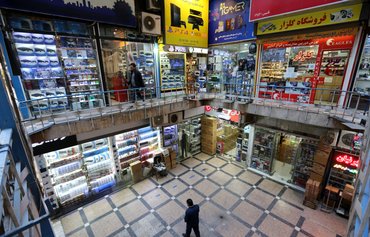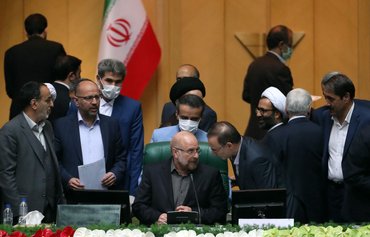Rocket attacks on Baghdad's Green Zone carried out by Kataib Hizbullah and other Iran-backed Iraqi militias have been on the rise in recent months, observers told Diyaruna.
Each attack proves the US "maximum pressure" campaign is the right strategy in dealing with the Iranian regime's malign behaviour, they said, and gives the US all the leverage it needs to rally the international community against Iran.
"Each one of these attacks is an act of terrorism, which in turn becomes a reason for the US to increase the pressure, to intensify the sanctions, to further isolate the Islamic Republic," a former Iranian navy analyst told Diyaruna.
The attacks strengthen the US position, proving that Iran is not a responsible actor and poses a threat to Middle East security.
Inside Iraq, public and political sentiment is also turning against Iran. Prime Minister Mustafa Kadhemi is pushing for reforms that would curtail the activities of pro-Iran militias, including Kataib Hizbullah.
"Public opinion in Iraq is turning against Iran, and so is the political atmosphere," said the navy analyst, who asked that he not be named.
He pointed to protests in Iraq against the malign activities of the Islamic Revolutionary Guard Corps (IRGC).
In late August, Kadhemi launched an effort to seize illegal weapons held by pro-Iran militias in Baghdad and Basra. Also in August, gunmen killed two activists, sparking protests in Basra and other cities in Iraq. Some demonstrators set fire to buildings used by pro-IRGC groups.
In December, protestors took to the streets in Iraq, demanding wide-ranging government reforms and an end to the influence of IRGC-affiliated groups in Iraq. IRGC-backed militias participated in the suppression of those protests.
Iran spends 2.8% of GDP on proxies
Meanwhile, the Iranian people, most of whom are suffering under intense economic pressure, also expressed anger at the Islamic Republic's regional interventions.
"As an Iranian, I look at the resources that the Islamic Republic is spending on its regional proxies, and I think that money could have been spent on improving conditions for the poorest of the poor in Iran," US-based Iranian journalist Shahin Mohammadi told Diyaruna.
Western media has reported that the IRGC spends between $10 billion and $30 billion a year on its regional proxies.
"It is a bitter fact that Iran is spending at least 2.8% of its annual gross domestic product (GDP) on these proxy wars that are meant to undermine the US," Mohammadi said. "Meanwhile, inside Iran, there is drought, there are children living without access to clean water, education or healthcare."
By comparison, Iran's 2020-2021 public education budget is $1.3 billion, while its public health budget is $2 billion, according to Iranian news reports on the Islamic Republic's annual budget.
On social media and in public protests over the past two years, Iranians are demanding that the regime stop supporting regional militias, including Kataib Hizbullah, Mohammadi said.
Most Iranians want the system to focus on domestic priorities, he said, noting that only a small minority supports the Islamic Republic's openly stated mission to form a sphere of influence in the region.
"Most Iranians see Iran's support for these groups for what it is: an attempt by the Islamic Republic to undermine the security of the region," Mohammadi said.

![Militiamen from Iran-backed Iraqi militia Kataib Hizbullah hold flags in Iraq in a photo taken in April. [Photo via IRNA]](/cnmi_di/images/2020/09/21/26097-Iran-Kataib-Hizbullah-600_384.jpg)






